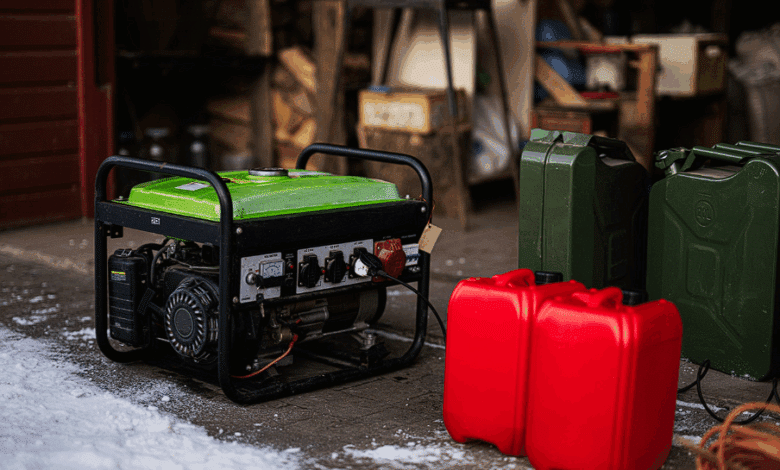Diesel vs. Gas Generators – Which Is More Reliable?

When comparing diesel and gas generators, the key difference lies in cost dynamics—diesel units typically come with a higher upfront cost but offer lower operational expenses, while gas generators are more budget-friendly initially but have higher long-term maintenance and fuel costs.
Quick Comparison: Diesel vs. Gas Generators
| Feature | Diesel Generators | Gasoline Generators |
| Initial Cost | Higher | Lower |
| Ongoing Cost | Lower | Higher |
| Fuel Efficiency | High | Moderate |
| Fuel Availability | May be limited in some areas | Widely available |
| Safety | Safer (less flammable) | Moderate (more flammable) |
| Noise Level | Louder | Quieter |
| Cold Weather Start | Harder to start in winter | Easy cold start |
| Maintenance | Low maintenance | Frequent maintenance |
| Lifespan | Long | Average |
Diesel vs. Gas Generators – Detailed Breakdown
Initial & Ongoing Costs
Diesel generators are built with more complex and durable parts, contributing to their higher upfront cost. However, over time, they prove more economical due to better fuel efficiency and fewer tune-ups. Diesel engines don’t rely on spark plugs or carburetors, which means fewer parts to replace or maintain.
For reference, a typical diesel generator might start around $900, while a gas-powered unit can be found for $300 or less.
Efficiency: Diesel vs. Gas
Diesel engines operate with higher compression ratios (between 14:1 and 25:1), making them more fuel-efficient compared to gasoline engines, which range between 8:1 and 12:1. Diesel engines use compression ignition, consuming less fuel over time.
Fuel Availability
Although diesel and gasoline are generally available at most fueling stations, there may be occasional difficulty finding diesel in remote areas. That said, most urban and suburban locations offer both.
Safety Considerations
Modern generators are certified by EPA and CARB for emissions and safety, but diesel has an edge when it comes to flammability. It’s less volatile than gasoline, making diesel-powered units a safer choice—especially in large-capacity models.
Noise Output
Diesel engines tend to be noisier. While newer models, especially those from brands like Generac, have made strides in noise reduction, diesel units still can’t match the whisper-quiet operation of inverter gas generators (typically 55–65 dB at 30–40 feet). Gas generators, especially small portable ones, are ideal for quiet environments.
Maintenance Requirements
Diesel engines have fewer moving parts and no spark plugs, making them easier to maintain. For instance, a diesel unit like the Generac Guardian 24kW may only need maintenance every 12,000–15,000 hours. By contrast, a gas generator like the Champion 4500-watt inverter may require servicing after 6,000 hours. Gas engines are also more prone to corrosion and carbon buildup.
Lifespan
Diesel generators boast a significantly longer lifespan—often lasting up to 40,000–50,000 hours—thanks to more efficient combustion and robust engine components. Large diesel units especially are engineered for durability, whereas gasoline units, even well-maintained ones, tend to have a shorter operational life.
Eco-Friendliness
Both generator types emit pollutants, but the trade-off is nuanced. Diesel emits fewer greenhouse gases like CO₂ and NOx but produces more particulate matter. Gasoline burns cleaner in terms of particulates but contributes more to greenhouse gas emissions. Overall, neither option is significantly “greener” than the other.
Diesel Generator Fuel Consumption (Per Hour)
| Generator Size | 25% Load (L/hr) | 50% Load (L/hr) | 75% Load (L/hr) | 100% Load (L/hr) |
| 8–10 kW | 0.8 – 0.9 | 1.3 – 1.6 | 1.8 – 2.2 | 2.4 – 2.9 |
| 12–20 kW | 1.1 – 1.8 | 1.9 – 3.1 | 2.7 – 4.5 | 3.6 – 6.0 |
| 24–40 kW | 2.2 – 3.6 | 3.7 – 6.2 | 5.4 – 9.0 | 7.2 – 12.0 |
| 60–80 kW | 5.4 – 7.2 | 9.4 – 12.5 | 13.5 – 18.0 | 18.0 – 24.0 |
| 200–400 kW | 18 – 36.0 | 31.2 – 62.4 | 45.0 – 90.0 | 65.0 – 120.0 |
| 500–600 kW | 44 – 55 | 84.1 – 100 | 120 – 143.2 | 162.2 – 194.5 |
| 750 kW | 70 | 124.5 | 178.6 | 242.76 |
Pros & Cons
Diesel Generators
Pros:
- Fuel-efficient and lower long-term costs
- Longer lifespan
- Reliable for whole-house backup
- Requires less frequent maintenance
- Safer due to lower flammability
- More compact in small sizes
- Emits fewer greenhouse gases
Cons:
- Higher upfront cost
- Can be harder to find fuel in rural areas
- Noisier (especially open-frame designs)
Gasoline Generators
Pros:
- Lower initial price
- Fuel is widely available
- Quieter operation
- Cold-weather friendly starts
- Ideal for small-scale or occasional use
Cons:
- Higher operational cost
- Requires frequent maintenance
- More flammable
- Shorter lifespan
- Not suited for large home backup
Which One Should You Choose?
Choose a gas generator if:
- You need a small, portable unit for light use (camping, job sites, etc.)
- You value low upfront cost and convenience
Choose a diesel generator if:
- You need a reliable, long-lasting power source for whole-home or extended use
- You prefer lower long-term costs and fewer maintenance hassles
FAQs
Why are diesel generators more expensive?
They’re built with more durable components to handle higher pressure and extended use, making them better suited for demanding applications like home backup systems.
How long can a diesel generator run non-stop?
Manufacturers typically rate them for 450–500 hours of continuous operation with proper oil and coolant checks. Still, it’s best to rest the unit after 12–13 hours and inspect oil/coolant levels every 28 hours.
Can a diesel generator power a whole house?
Absolutely. Diesel generators are designed for heavy loads and are ideal for running entire homes.




![How to Bypass CO Sensor on Generator – [4-Step Safety Guide]](https://www.generator411.com/wp-content/uploads/2025/08/co-sensor-on-generator-390x220.png)